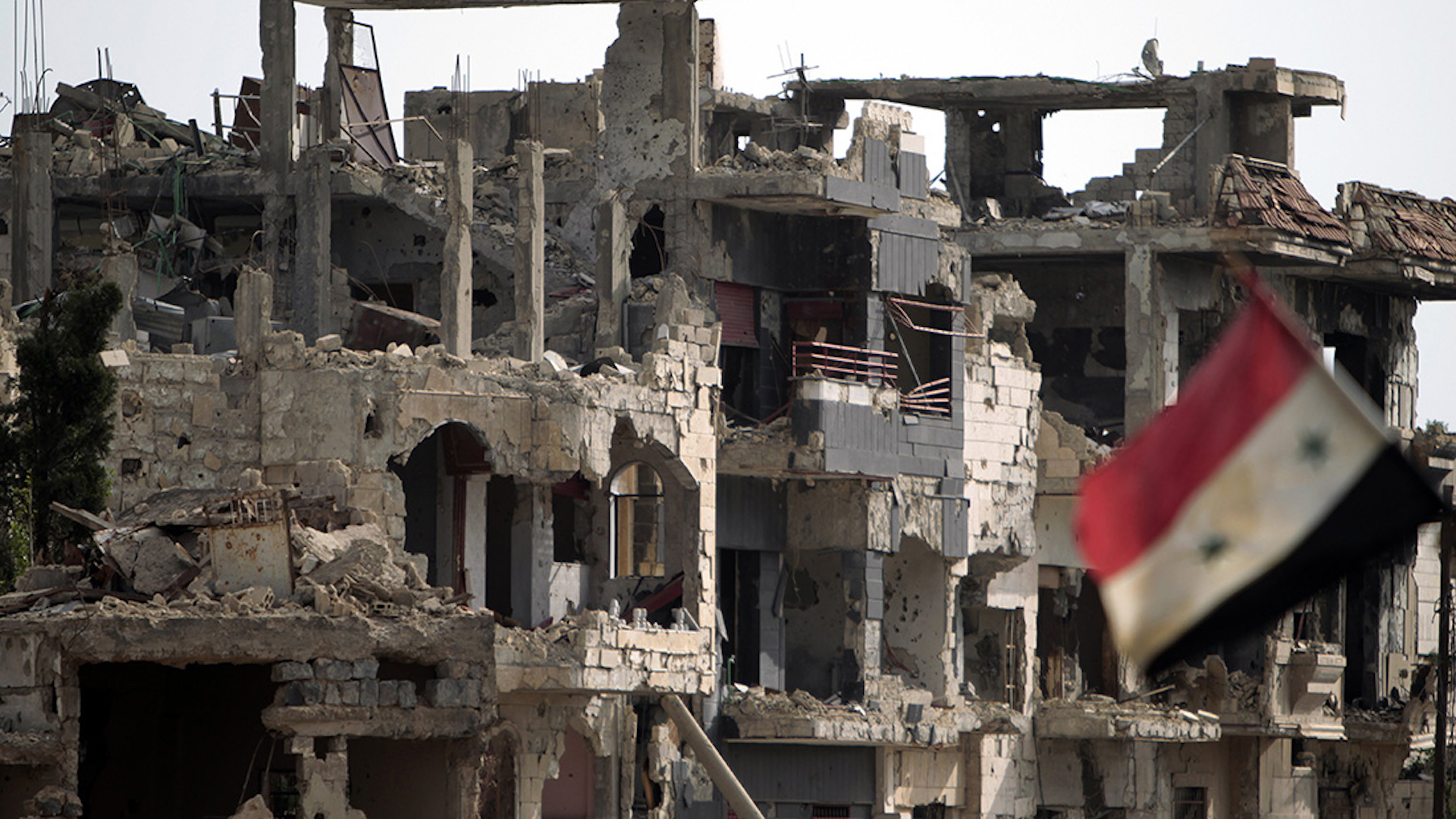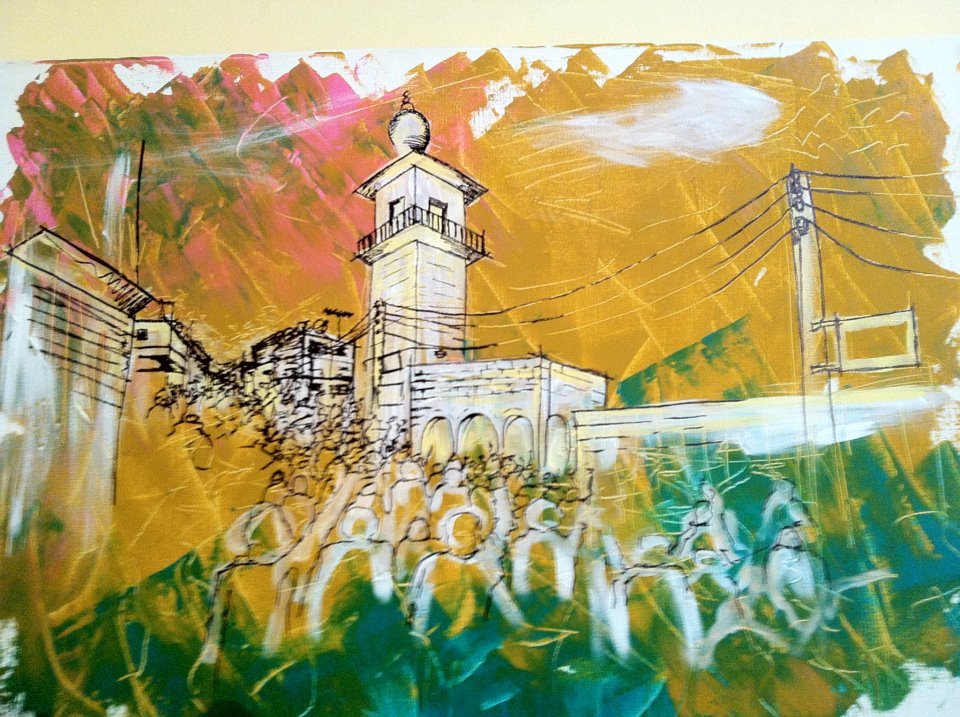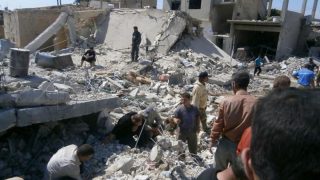On December 20, 2019, US President Donald Trump signed into law the Caesar Syria Civilian Protection Act, so named after the Syrian military photographer—codenamed “Caesar”—who defected in 2013, leaking tens of thousands of graphic images of detainees tortured to death in Syrian government prisons.
The bill is the result of nearly four years of advocacy by the Coalition for a Democratic Syria, a US-based organisation comprising Americans for a Free Syria, the Syrian American Council, Syrian Christians for Peace and the Syrian Emergency Task Force. The Syrian National Coalition, the Syrian opposition's main representative body, based in Turkey, has welcomed the bill and thanked the work of these Syrian-American organizations.
After the final vote, many of these groups argued that the bill is a step in the direction for accountability. US Secretary of State Mike Pompeo meanwhile called the act "an important step to promote accountability for the [Assad regime], which has committed large-scale atrocities in Syria.”
The text of the Caesar Bill itself states that: “It is the policy of the United States that diplomatic and coercive economic means should be utilized to compel the government of Bashar al-Assad to halt its murderous attacks on the Syrian people and to support a transition to a government in Syria that respects the rule of law, human rights, and peaceful co-existence with its neighbors.” One way in which the US proposes to do that is through secondary sanctions—sanctioning foreign individuals and institutions doing business with Syrian entities that are themselves already under US sanctions.
The Caesar Bill has since become the subject of debate among progressive and democratic Syrian actors. The key contentions of the bill are the nature and reach of the secondary sanctions; the measures targeting Syria’s reconstruction efforts, various sections of the economy and Syria’s allies (Russia and Iran); and the bill’s potential impacts on the broader Syrian population. As such, it's important to analyze the set of measures that make up the Caesar Bill.
Deepening sanctions since 1979
Syria has been under US sanctions since 1979, after it was placed on a US list of state sponsors of terrorism "because of its continuing policies in supporting terrorism, its former occupation of Lebanon, pursuing weapons of mass destruction and missile programs, and undermining U.S. and international efforts to stabilize Iraq,” according to the US Department of State [i].
However, the US would increasingly target individuals and entities, Syrian government officials and business sectors in the wake of the uprising that broke out in Syria in March 2011. Secondary sanctions on Syria, enabling the US president to sanction foreign individuals and institutions doing business with Syrian entities already under US sanctions, existed prior to the Caesar Bill, but were rarely implemented [ii].
Even then, the Caesar Bill is the most significant set of measures taken by Washington against the Syrian regime and its allies in Syria [iii].
The text of the bill allows for the punishment of any government or private entity seen to aid the regime as well as groups and entities linked to it, or to contribute to the reconstruction of Syria, in addition to any assistance provided to the governments of Russia and Iran in Syria. The president can sanction any international company or individual that invests in Syria's energy, aviation, construction or engineering sectors, as well as anyone who lends funds to the regime (Section 102).
The bill may also target the Central Bank of Syria—based on a decision following a report written by Secretary of the Treasury determining “whether reasonable grounds exist for concluding that the Central Bank of Syria is a financial institution of primary money laundering concern" (Section 101). If Syria’s Central Bank is considered to play a significant role in money laundering, then sanctions can then be imposed.
The Caesar Bill also allows the US president, 90 days after the enactment of the bill, to analyse the “potential effectiveness, risks, and operational requirements of military and non-military means to enhance the protection of civilians inside Syria” (Section 303).
The bill ends by citing provisions allowing for the suspension of sanctions by the president (Section 401):
- If Syria and Russia airplanes stop bombing civilians;
- If Iranian, Syrian and Russian forces, as well as entities connected to them, no longer restrict humanitarian access to besieged areas, and the possibilities for civilians to leave freely;
- If all political prisoners are released, and the appropriate international human rights organisations are given full access to Syria’s prisons and detention facilities;
- If the bombing of “medical facilities, schools, residential areas, and community gathering places, including markets” by Syrian, Russian, Iranian forces, as well as entities connected to them, ceases;
- If the possibility for the "safe, voluntary, and dignified return of Syrians displaced by the conflict” is achieved;
- And finally, if there is accountability for “perpetrators of war crimes in Syria and justice for victims of war crimes committed by the Assad regime, including by participation in a credible and independent truth and reconciliation process.”
Measures targeting war profiteers
The prospect for sanctions to be suspended, provided basic human rights are respected in Syria and a process of accountability started, would of course resemble a great achievement for all sections of the Syrian population—especially for those who have suffered, or continue to suffer, at the hands of Damascus and its allies. Hardly anyone can oppose such measures.
Contrary to the claims repeated on an almost daily basis by Syrian government officials, sanctions and so-called “foreign conspirators” are not the main reason for the socio-economic problems facing the country.
Similarly, the sanctioning of any government or entity that “significantly facilitates the maintenance or expansion of the Government of Syria's domestic production of natural gas, petroleum, or petroleum products,” and “knowingly, directly or indirectly, provides significant construction or engineering services to the Government of Syria” (Section 102) could potentially target Russian and Iranian private companies trying to benefit from the spoils of their military interventions by taking control of various Syrian natural resources and national infrastructures, through deepening neoliberal policies and public-private partnerships (PPPs).
For example, in December 2019, Syria's parliament approved oil exploration contracts signed earlier in the year with two Russian companies (Mercury LLC and Velada LLC) in three blocs—including an oilfield in northeast Syria and a gas field north of the capital Damascus. These Russian companies should, and could, be among the entities sanctioned because they are contributing to expanding Syria’s oil production. Handing contracts to Mercury LLC and Velada LLC is in line with the Syrian government's strategy toward friendly states that stood by Syria, according to Syrian Oil Minister Ali Ghanem. Russia in particular is already trying to take advantage of this situation.
At the same time, in the framework of Syria’s reconstruction process, these sanctions could target significant foreign entities, which could potentially invest and benefit in the Syrian government's urban masterplans. Some Emirati companies and officials have actually visited Syria with this aim, and showed an interest in investing in Marota City, a high-end luxury masterplan in southwest Damascus. Even so, no foreign investments have gone to Marota at the time of the writing.
Contrary to the claims repeated on an almost daily basis by Syrian government officials, sanctions and so-called “foreign conspirators” are not the main reason for the socio-economic problems facing the country. The regime is the main actor responsible for this situation.
Firstly, the Syrian government's economic policies have massively impoverished large sectors of the Syrian population, especially since the early 2000s. Damascus used the war to deepen pre-war neoliberal policies accompanied by austerity measures while reinforcing the authoritarian and patrimonial aspects of the regime, albeit often with new networks and personalities.
The reconstruction process suggested by the regime in Damascus will therefore reward the loyalty of its network of crony capitalists and foreign allies and to punish former rebel communities—many of which were economically marginalized before the war began. The current regime’s policies for reconstruction are themselves based on policies that existed before the war, whereby development is focused on luxurious real estate projects at the expense of impoverished populations and informal and popular neighborhoods. In the current context, these policies will only consolidate the regime’s power and its domination over Syrian society, while also deepening pre-existing political and socio-economic grievances that ultimately fuelled the 2011 uprising [iv].
Moreover, the vast damage and widespread destructions meted out against Syria's cities and infrastructure is, for the most part, the result of Damascus’ war machine, with the assistance of its allies Russia and Iran. As a reminder, the uprising and ensuing international conflict has caused more than half a million deaths and led to the largest displacement crisis since the end of the Second World War. Six million Syrians are internally displaced, while more than 5.6 million Syrians are registered as refugees outside the country. Around 90 percent of the population live under the poverty line, and more than 11 million people are in need of humanitarian aid inside the country. The cost of reconstruction has been estimated in the range of $400 billion.
There are of course other foreign actors that contributed to the displacement of populations and destructions in the country—particularly the military interventions of the US and Turkey and, to a lesser extent, the armed opposition as well as hardline Islamist and jihadist militias.

The effect of sanctions on ordinary Syrians and the regime's power networks
At the same time, it's important to reiterate these realities about the Syrian regime's role while also acknowledging the fact that the Caesar Bill could—and probably will—contribute to intensifying socio-economic problems in Syria. Its set of sanctions could participate in the deepening impoverishment of some sections of the population and represent a further obstacle to their future economic recovery.
For example, Syria lacks enough oil and gas for local consumption. Syria produces only 500 tons per day, which represents only 40 percent of Syria’s domestic gas needs (in periods of normal consumption while in winter, peak consumption is closer to 1,300 tons daily). It also faces difficulties in importing gas as a result of the sanctions, according to the director of gas operations at the state Hydrocarbons Company, Ahmed Hassoun. The country needs around 136,000 and 140,000 barrels a day, while, according to statements in pro-government daily al-Watan, the Ministry of Oil can only secure 24 percent of the actual needs.
The country suffered a severe oil shortage between November 2018 and April 2019, notably as a result of the US decision in November 2018 to increase its pressure on Syria by announcing that it would seek to impose sanctions against any party—including shipping companies, insurers, vessel owners, managers and operators— involved in shipping oil to Syria. Similarly, an acute gas crisis has taken place in various areas of the country. This situation also occurs amid continuing illegal black-market monopolies and problems of distribution among governmental institutions [v].
In this perspective, the possibility of sanctioning any entity supporting the expansion of national production of oil and gas, and putting obstacles to import, will most probably deepen these problems by creating even greater shortages of these resources and increasing its costs on the market. This will in turn have dire consequences for ordinary Syrians as well as sectors of the productive economy such as manufacturing and agriculture (which are both very dependent on these resources) by notably increasing production costs.
The deepening of broad, general sanctions against Syria through the Caesar Bill will therefore significantly affect the recovery of manufacturing and agricultural activities, which are already affected by the current sanctions imposed by the US and EU.
Similarly, reconstruction efforts, even though limited, will most probably be hindered as the bill targets the construction sector and engineering services.
There are humanitarian exemptions that exist within the current sanctions but because of the lack of clarity, risk-adverse banks, insurance and shipping companies, and sellers of humanitarian goods have, more often than not, preferred not to engage with anyone or anything related to Syria. Moreover, overlapping sanction regimes have created so much doubt and uncertainty about how to comply with all the measures that banks, exporters, transport companies and insurance companies have nearly completely refused to conduct business in Syria—including with NGOs providing assistance to Syrian civilians.
The Syrian regime’s socioeconomic and political policies are likely to exacerbate social, economic and regional inequalities throughout the country, only deepening problems that were at the heart of the uprising that first started in March 2011.
Similarly, products characterised as dual-use also pose a problem. For example, nitrous oxide can be used for anaesthetics in hospitals but also to make bombs. Other dual-use items include agricultural fertiliser and pesticides, certain drilling tools, pipes, chlorine products used for water purification and sanitation (but also chemical weapons), construction equipment, computers and IT equipment, and power generators.
The Caesar Bill will most probably reinforce these dynamics, although exemptions (Section 302) also exist regarding NGOs’ services in Syria and the “ability of humanitarian organizations to access financial services to help facilitate the safe and timely delivery of assistance to communities in need in Syria.” However, there is no clear process to put an end to this lack of clarity around the issue.
Section 303 of the bill is also potentially problematic in that it allows Washington to determine the potential means, including military means, to enhance the protection of civilians. The potential interpretation of these “methods” is very broad. Threats of significant military intervention in Syria by the US should, however, be tempered given that Washington has never sought to actually overthrow the regime—quite the opposite, in fact—and is already in the process of withdrawing its military forces from Syria.
One more consideration to take into account is the fact that these sanctions, supported by foreign entities as well as Syrian organisations and activists working in exile, will only increase the political gap with Syrians inside Syria, who will ultimately be the ones suffering from the consequences of this new tranche of sanctions. As mentioned previously, the Syrian regime’s socioeconomic and political policies are likely to exacerbate social, economic and regional inequalities throughout the country, only deepening problems that were at the heart of the uprising that first started in March 2011. Sadly, most of the opposition failed—even before 2011—to put forward a viable socioeconomic alternative to the regime’s neoliberal policies (and in fact the Syrian National Council and the Syrian Coalition proposed policies not dissimilar to those of the regime). For the most part, the exiled opposition, too, has failed to tackle the socioeconomic issues at the heart of the 2011 uprising, while not proposing an inclusive political programs. The support for the Caesar Bill from these pro-opposition entities could strengthen their lack of legitimacy by worsening the socio-economic status of large segments of the population back home.
Conclusion: The struggle for accountability
The struggle for accountability against the Assad regime should be an absolute priority for all progressives and democrats. The recent prosecution in Germany of two former Syrian secret service officers, who were charged with crimes against humanity, is an important step forward towards justice for the atrocities committed by the regime. Efforts must continue throughout the world to ensure that the main perpetrators of state torture under Assad and all war criminals in Syria are brought to justice.
In this same matter, the possibility of foreign funding for the reconstruction under the umbrella of the Syrian state would threaten to reinforce the process of demographic engineering in former opposition-held territories (something that is mainly based on political and socio-economic motives rather than sectarian ones, as is often claimed). This process, which has already begun, driven by campaigns of forced displacement and the evictions of original residents, is being cemented by numerous laws enacted by the Syrian government and President Assad. They considerably discourage and obstruct refugees from returning to Syria. In this perspective, the Caesar bill aims to create obstacles in the way of these dynamics, which is positive. Similarly, it aims at preventing Russia and Iran from benefiting from the spoils of war by taking control of national resources and infrastructure.
That said, there are questions that need to be raised about effectiveness of the Caesar Bill in reaching these objectives, as well as the willingness of the US to actually achieve accountability and respect for human rights in Syria at the same time that it represents the main guardian of neoliberal, militarist and authoritarian order (including through its support for dictatorial regimes) in the region. Indeed, the National Defense Authorization Act for Fiscal Year 2020, to which the Caesar Bill was added before passing, represents an attempted continuation of US military dominance.
Additionally, while the Caesar Bill allows the US president to take action and sanction specific institutions and individuals, he is not compelled to do so. In fact, there are no obligations whatsoever. More generally this bill places too much power in the hands of the US executive branch—in other words, the president.
Moreover, measures have to be taken in the framework of the Caesar Bill, and sanctions more generally, to truly alleviate the risk of sanctions harming ordinary Syrians, productive sectors of the economy as well as any possible reconstruction efforts not based on achieving the regime’s objectives.
At the same time, the vote on the Caesar Bill at the end of December last year has not halted ongoing pro-government offensives by Syria and Russia against Idlib province, nor has it pushed Damascus towards any kind of compromise with its political opponents.
On a more historical note, sanctions have rarely had the expected results or achieved any change in a state’s behaviour. Certain voices have pointed to the “successful example” of South Africa. In 1986, a series of punitive economic measures and an oil embargo were imposed by the UN in an attempt to end the racist apartheid regime. Then in 1991, this regime was abolished. But this official narrative is rather far from the truth. Firstly, the sanctions were largely circumvented by the apartheid regime of South Africa by its close connections with Western states, which resisted for a long time before imposing sanctions. The main reason for the end of this regime was, above all, significant resistance and popular mobilization from people on the group, led by the domestic insurgency of the African National Congress and its allies within the country, and the vast campaigns of solidarity throughout the word to boycott the apartheid regime.
For these reasons, the most important challenge is for Syrian democrats and progressives to regain autonomy from foreign actors by building their own networks and offering an inclusive, democratic project with clear socio-economic alternatives that will benefit ordinary Syrians, that could appeal to large sectors of society within the country, refugees and the diaspora. The absence of a structured and independent, democratic and inclusive Syrian political opposition, which appealed to ordinary Syrians and social actors such as independent trade unions, made it difficult for various sectors of the population to unite and challenge the regime on a national scale.
The latest demonstrations in Sweida to protest against the economic situation and difficult living conditions, an often repeated criticism in many other areas of the country, and the continued protests and clashes in Daraa against the regime’s forces, demonstrate this situation: regional protests without much coordination between them.
The author would like to thank Gilbert Achcar, Jihad Yazigi and Rohan Advani for their comments and help in writing this article.
[i] Being on a US list of state sponsors of terrorism does not necessarily mean that the country stops trading with other states.
[ii] Russia’s Tempbank company was, for instance, blacklisted in 2014 for providing millions of dollars to the Central Bank of Syria and to Sytrol, both of which are under US sanctions. For more information, see: https://www.syria-report.com/news/economy/caesar-act-meaningful-long-term-consequences-less-important-short-term-impact
[iii] There are no UN sanctions on Syria itself—Russian and Chinese vetoes have prevented that. Sanctions have, however, been imposed unilaterally by many states opposed to the Syrian regime, including the United States and the 28 member states of the European Union as well as Japan, Canada, Australia, Switzerland, Norway and Turkey. The 22 countries of the League of Arab States have also sanctioned Syria.
[iv] Poor suburban neighborhoods expanded considerably in the 2000s, while urban real estate speculation unleashed by the influx of Gulf capital, together with an end to rent controls, drove the cost of housing beyond the means of large sectors of the middle class. This pushed many Syrians into marginal areas of cities, where they were often forced to live in informal housing. This situation led to a housing crisis, a shortfall of around 1.5 million formal homes in 2007, with sections of the population either becoming homeless or living in informal areas. The regime’s solution to the crisis was to outsource the problem to the private sector, as it did increasingly with the economy as a whole. But the private sector invested in luxury housing catering for rich Syrians (within the country and the diaspora), foreigners and tourists. Investments in luxury tourist and residential developments attracted around $20 billion in investments from the beginning of the 2000s to mid-2007, while it was estimated that it would have cost some $24 billion to adequately upgrade all the country’s informal housing.
[v] See for example, in Daraa: https://english.enabbaladi.net/archives/2019/12/severe-gas-crisis-in-daraa-syrians-resort-to-firewood-and-electricity/; and Aleppo:https://npasyria.com/en/blog.php?id_blog=1292&sub_blog=12&name_blog=Domestic%20gas%20crisis%20in%20Aleppo,%20between%20reality%20and%20officials








